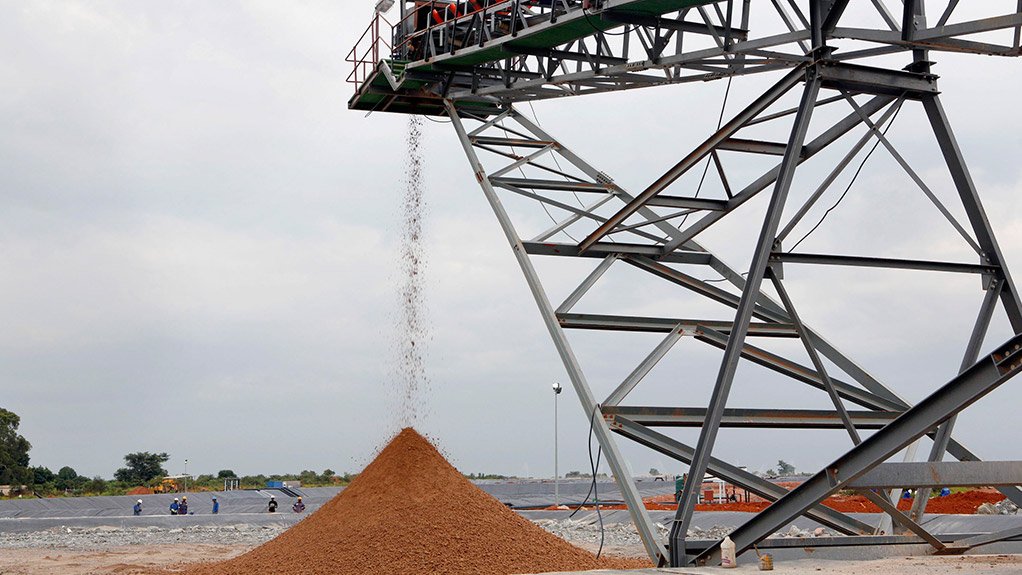Zambia dumps copper concentrate import tariff



CONCENTRATE CONSTERNATION Zambia’s concentrate production does not meet processing capacity as some of its smelters are in ramp up phase
TALENT NG’ANDWE Zambia’s processing capacity stands at about 3.6-million tons of concentrate a year and its output of concentrates is about 2.9-million tons a year
The Zambia Chamber of Mines (ZCM) has welcomed the removal of the 7.5% import duty on copper concentrates, following a recent statement by Finance Minister Felix Mutati.
This was preceded by mining companies voicing concern for months about the impact that the imposition of the duty would have on the viability of a number of operators in the country.
ZCM acting CEO Talent Ng’andwe says the chamber acknowledges that, from inception, the Ministry of Finance and government at large were committed to fostering the sustainable operations of mining companies, as evidenced by its resolve to guide the line Ministries, as well as the Zambia Revenue Authority, on other issues such as value-added tax. “This will surely help to continue contributing to job creation and poverty alleviation,” he asserts.
Ng’andwe states that the ZCM is committed to working with all stakeholders to put in place a tax system that will increase the flow of revenue to government coffers for social and economic development on a sustainable basis.
“We encourage investment in the mining sector for the sustainability of the industry and the security of direct, indirect and induced jobs,” he says, adding that the system must be predictable and stable to enable long-term planning by the mine operators and potential new entrants into the industry.
Ng’andwe comments that the system must also encourage efficiency in Zambian mines by significantly improving cost profiles.
Meanwhile, he says, it must be emphasised that 2016 was not a good year for the mining sector in Zambia. Nonetheless, Ng’andwe commends government for “striving to make the mining sector stay afloat”.
He remarks that the mining sector in 2015 and 2016 faced challenges that were beyond the control of all stakeholders, including the low copper price and the nationwide power deficit.
“It is our sincere hope that the Zambian government and the mining industry can continue having open and fruitful discussions going forward. The removal of the import duty on copper concentrates will help in stabilising independent smelters and finished copper output, in addition to employment and contributions to government revenue.”
The ZCM request for a waiver of the duty was recently tabled before the Parliamentary Estimates Committee, based on a number of reasons.
The chamber noted that mining companies with excess processing capacity procure copper concentrates from the Democratic Republic of Congo (DRC) with the aim of using the capacity of their respective smelters. However, Zambia’s own concentrate production does not meet processing capacity, as some smelters are in ramp-up mode and are yet to reach design capacity.
The ZCM points out that smelter operations need to have a minimum feed or material treatment rate of about 80 t/h. If this is not achieved, smelter wear and tear will increase and this will eventuate in frequent shutdowns as opposed to the current maintenance shutdowns, which occur after every two years.
Ng’andwe elaborates that the normal costs of such shutdowns are estimated at $10-million for legacy operations. “Ideally, such costs should only be incurred after ten years. To operate at this minimum capacity, smelters need a steady rate of feed and currently Zambia does not have sufficient mining capacity to meet all the smelters’ capacity.”
Moreover, the chamber explains that to make a blend which optimises smelting operations, Zambia would need a combination of chalcopyrite and chalcocite. However, the ZCM notes that availability of chalcocite in Zambia is limited, with only Konkola Copper Mines and Lubambe Copper Mines in possesion of high-grade material suitable for optimal smelting.
Ng’andwe says that the deficit of such material necessitates outsourcing from the DRC. Since there is a deficit in the concentrate’s total required chemical composition of chalcocite and chalcopyrite, procurement of such material from outside Zambia is “highly necessitated”.
If copper concentrates with less chalcopyrite are used in the blend plan, operating costs will increase as heavy fuel oil consumption increases.
The ZCM highlights that the required design copper grade of 38% cannot be sufficiently maintained with local copper concentrate material. Copper concentrates from the DRC achieve grade ranges above 40%.
Ng’andwe comments that this pushes the weighted average grade of copper closer to the required grade, which is why it is required. He remarks that the proposed duty would greatly diminish the amount of copper concentrates imported into Zambia.
Consequently, this would have hindered the operations of smelters in the country, particularly for independent smelters that rely solely on acquiring concentrates. “This will severely decelerate economic growth,” Ng’andwe stresses.
Comments
Press Office
Announcements
What's On
Subscribe to improve your user experience...
Option 1 (equivalent of R125 a month):
Receive a weekly copy of Creamer Media's Engineering News & Mining Weekly magazine
(print copy for those in South Africa and e-magazine for those outside of South Africa)
Receive daily email newsletters
Access to full search results
Access archive of magazine back copies
Access to Projects in Progress
Access to ONE Research Report of your choice in PDF format
Option 2 (equivalent of R375 a month):
All benefits from Option 1
PLUS
Access to Creamer Media's Research Channel Africa for ALL Research Reports, in PDF format, on various industrial and mining sectors
including Electricity; Water; Energy Transition; Hydrogen; Roads, Rail and Ports; Coal; Gold; Platinum; Battery Metals; etc.
Already a subscriber?
Forgotten your password?
Receive weekly copy of Creamer Media's Engineering News & Mining Weekly magazine (print copy for those in South Africa and e-magazine for those outside of South Africa)
➕
Recieve daily email newsletters
➕
Access to full search results
➕
Access archive of magazine back copies
➕
Access to Projects in Progress
➕
Access to ONE Research Report of your choice in PDF format
RESEARCH CHANNEL AFRICA
R4500 (equivalent of R375 a month)
SUBSCRIBEAll benefits from Option 1
➕
Access to Creamer Media's Research Channel Africa for ALL Research Reports on various industrial and mining sectors, in PDF format, including on:
Electricity
➕
Water
➕
Energy Transition
➕
Hydrogen
➕
Roads, Rail and Ports
➕
Coal
➕
Gold
➕
Platinum
➕
Battery Metals
➕
etc.
Receive all benefits from Option 1 or Option 2 delivered to numerous people at your company
➕
Multiple User names and Passwords for simultaneous log-ins
➕
Intranet integration access to all in your organisation




















